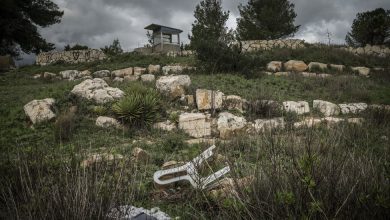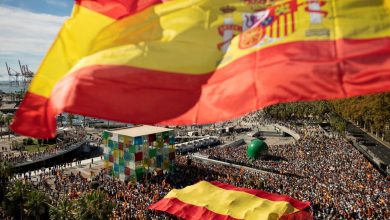Survivors of Deadly Night at Greek Border Say They Were Left to Die

EDIRNE, Turkey — It was a cold night, lashing with rain and with a sharp north wind blowing, when Greek border forces pushed up to 50 migrants back across the river that marks the border with Turkey.
“It was so bad,” said one, Jaber Jang Singh, 33, a farm laborer from India. “With the weather conditions they should not have done that. This was to leave us to die.”
Nineteen did die that night, unable to reach shelter in the waterlogged rice fields on the Turkish side. They were found over the next two days, huddled against a low cement wall and collapsed on the edge of a muddy road. Before pushing the people back, Greek officers had stripped them of their jackets, sweaters and shoes.
Four survivors recounted the episode in interviews with The New York Times at a Turkish government center for migrants in the provincial city of Edirne. Their accounts matched recent Turkish government statements, which accused the Greek authorities of conducting pushbacks illegal under international law.
The Greek migration minister, Notis Mitarachi, said at the time that the deaths were a tragedy, but he denied that the people had ever been in Greece.
“These migrants never made it to the border,” he said in a statement. “Any suggestion they did, or indeed were pushed back into Turkey, is utter nonsense.” His spokesman declined to comment further this week.
The toll on the night of Feb. 1 was the highest of any single incident yet discovered in the two years since the Turkish authorities and human rights groups say Greece has embarked on a hard-line campaign under the conservative Prime Minister Kyriakos Mitsotakis to turn away migrants trying to reach Europe, whether by land or by sea.
Greece not long ago received hundreds of thousands of asylum seekers, at the height of the migrant crisis in 2015, when more than one million asylum seekers surged into Europe. Though the flow is now vastly reduced, Greeks have grown exhausted and bitter that, as a frontline state, they have had to bear a greater burden of dealing with the asylum seekers than their E.U. partners.
Greek Coast Guard forces have been accused of setting migrants adrift in flimsy rafts, which has sometimes led to drownings before the crafts are intercepted by Turkish patrols.
At least three people have died in the Aegean Sea since last September, victims of almost 540 incidents of informal returns by Greece reported since the beginning of 2020, Filippo Grandi, head of the United Nations refugee agency, said in a statement released Monday.
The tactics are much the same along Greece’s land borders, which have for decades been a major crossing point, and the scene of pushbacks, of migrants from Asia, the Middle East and Africa heading to Europe.
The situation has grown worse since 2020, when President Recep Tayyip Erdogan of Turkey announced he was lifting restraints on migrants heading to Greece, and Greece strengthened its border controls. The two countries remain at loggerheads.
In a rare rebuke, Mr. Grandi warned in his statement that increasing violence against migrants and refugees on European borders was leading to loss of life, and singled out Greece for “recurrent and consistent reports” of violent pushbacks.
Mr. Mitarachi expressed surprise at Mr. Grandi’s comments in a statement issued by his ministry, and said that Greece protects the external borders of the European Union in compliance with international law and human rights.
That was not what the four survivors described. They said they had been detained inside Greece by uniformed Greek police, and held in makeshift camps for up to a day. Greek officers confiscated their belongings and stripped them of their outerwear and drove them to the edge of the River Evros, which divides Greece and Turkey.
“They took my phone, wallet, passport, a locket and bracelet, and my bus ticket,” Mr. Singh said. He had not even come from Turkey but had entered Greece from Serbia and was traveling by bus to the capital, Athens, when he was detained, but he was pushed into Turkey nevertheless.
At the river they were made to board a rubber dinghy in groups of eight to 10 and were pulled across the river with a rope and pulley system. Armed men in uniforms and black balaclavas oversaw the operation.
“It was not good but there was nothing we could do,” said Muhammad Saiful Islam, 22, an electrician from Bangladesh who was detained a few hours after crossing into Greece.
Barefoot, stripped down to a thin, hooded sweatshirt and jeans, he set out walking fast in pouring rain across the area’s patchwork of rice paddies, crisscrossed by canals and dirt roads hard to navigate even in daylight.
Two others from Bangladesh said they had crossed into Greece the night before and were pushed back to Turkey in a group of about 40 men around 10 p.m. “I was scared and so tired from the rain and cold,” said Riaz, 27, a tailor from Bangladesh, who like many in his country uses only one name.
He said he recognized one of the men who died, after photos were shared on social media. “We were walking fast and maybe they were behind,’’ he said, ‘‘and those who stayed behind died.”
After two to three hours walking and running Mr. Singh said his group reached a road and was picked up by a Turkish police patrol, which gave them clothes, juice and biscuits. “I was shivering and I was scared,” he said.
It was not till morning that a farmer heard a cry and, looking across a flooded canal, saw a group of migrants huddled against the low wall of a water pump. By the time rescuers reached the group through the floods, the lone survivor was unable to speak and died soon after.
Five men were found beside the pump, and seven more a few miles north across the waterlogged fields. Initial reports said 12 had died. It took another day before rescuers found the rest of the 19.
Their bodies were purple and icy to the touch, one rescuer said. Some had tried to pull off their shirts and pants in the last throes of death, he said. He spoke on condition his name not be published because he was not permitted to speak to the media.
The tensions and lack of coordination between Greece and Turkey are increasingly endangering lives, warned Philippe Leclerc, head of the U.N. refugee agency in Turkey. He called on Greece and Turkey to investigate the episode, as has the government of Somalia, which said five of the dead men were its citizens.
“The first thing is to ensure there is management and cooperation on both sides to avoid the loss of life — that is the first imperative,” he said. .”
Among migrants who have suffered pushbacks there was little doubt who was to blame.
A group of Moroccan migrants camping out in a derelict hotel on the outskirts of Ipsala, a town in the area where the deaths occurred, said the Greek border was the most difficult crossing in all of Europe, although they said Bulgarian border guards on the Turkish border used more violence.
The Moroccans said they had attempted the crossing from Turkey to Greece multiple times in recent weeks and had been beaten and pushed back by Greek soldiers, each time after being stripped of their money, documents, warm clothing and shoes.
One man, 38, who gave his name only as Hassan, a firefighter from the city of Fez, said on two occasions he had been shoved into the river and made to swim. A strong swimmer, he had helped several cross, but many had drowned, he said.
He was set on reaching France where his three children were taken into government care after their mother died. “We are not criminals,” he said. “We just want to work.”
The survivor, Mr. Riaz, was bitter about his treatment by the Greeks, and said that days after his freezing ordeal, he still did not have feeling in his feet.
“We know we were there illegally, but the government is not illegal, so they should not treat us illegally,” he said. “They treated us in an illegal manner and because of that one of my friends is dead.”
Gokce Saracoglu contributed reporting from Edirne and Safak Timur from Istanbul. Niki Kitsantonis contributed reporting from Athens.





